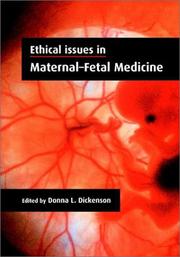| Listing 1 - 3 of 3 |
Sort by
|
Book
ISBN: 9780231159746 9780231534413 0231159749 0231534418 Year: 2013 Publisher: New York : Columbia University Press,
Abstract | Keywords | Export | Availability | Bookmark
 Loading...
Loading...Choose an application
- Reference Manager
- EndNote
- RefWorks (Direct export to RefWorks)
Personalized healthcare-or what the award-winning author Donna Dickenson calls "Me Medicine"-is radically transforming our longstanding "one-size-fits-all" model. Technologies such as direct-to-consumer genetic testing, pharmacogenetically developed therapies in cancer care, private umbilical cord blood banking, and neurocognitive enhancement claim to cater to an individual's specific biological character, and, in some cases, these technologies have shown powerful potential. Yet in others they have produced negligible or even negative results. Whatever is behind the rise of Me Medicine, it isn't just science. So why is Me Medicine rapidly edging out We Medicine, and how has our commitment to our collective health suffered as a result? In her cogent, provocative analysis, Dickenson examines the economic and political factors fueling the Me Medicine phenomenon and explores how, over time, this paradigm shift in how we approach our health might damage our individual and collective well-being. Historically, the measures of "We Medicine," such as vaccination and investment in public-health infrastructure, have radically extended our life spans, and Dickenson argues we've lost sight of that truth in our enthusiasm for "Me Medicine." Dickenson explores how personalized medicine illustrates capitalism's protean capacity for creating new products and markets where none existed before-and how this, rather than scientific plausibility, goes a long way toward explaining private umbilical cord blood banks and retail genetics. Drawing on the latest findings from leading scientists, social scientists, and political analysts, she critically examines four possible hypotheses driving our Me Medicine moment: a growing sense of threat; a wave of patient narcissism; corporate interests driving new niche markets; and the dominance of personal choice as a cultural value. She concludes with insights from political theory that emphasize a conception of the commons and the steps we can take to restore its value to modern biotechnology.
Sociology of health --- Professional ethics. Deontology --- biotechnologie --- bio-ethiek (medische, biomedische ethiek, bio-ethische aspecten) --- Medicine, Preventive --- Patient-centered health care --- Biotechnology --- Precision Medicine --- Public Health Practice --- Social Justice. --- Common Good --- Justice --- Obligations of Society --- Good, Common --- Justice, Social --- Medical care --- Disease prevention --- Diseases --- Prevention of disease --- Preventive medicine --- Pathology --- Preventive health services --- Preventive medicine physicians --- Public health --- bioéthique (éthique médicale, biomédicale, aspects bioéthiques) --- Moral and ethical aspects. --- ethics. --- Prevention --- Individualized Medicine --- precisiegeneeskunde --- gepersonaliseerde gezondheidszorg --- médecine de précision --- soins de santé personnalisés --- Social Justice --- ethics

ISBN: 110712848X 1280160144 9786610160143 0511118171 113914622X 0511066538 051106022X 0511307896 0511545126 0511068662 9780511066535 0521662664 9780521662666 0521664748 9780521664745 9780511068669 9780511060229 9780511118173 9780511545122 6610160147 9781280160141 9780511307898 Year: 2002 Publisher: Cambridge, UK ; New York, NY, USA : Cambridge University Press,
Abstract | Keywords | Export | Availability | Bookmark
 Loading...
Loading...Choose an application
- Reference Manager
- EndNote
- RefWorks (Direct export to RefWorks)
This book brings together an unusually broad range of experts from reproductive medicine, medical ethics and law to address the important ethical problems in maternal-fetal medicine which impact directly on clinical practice. The book is divided into parts by the stages of pregnancy, within which the authors cover four main areas: • the balance of power in the doctor-patient relationship and the justifiable limits of paternalism and autonomy • the impact of new technologies and new diseases • disability and enhancement (the 'designer baby') • difference - to what extent should the clinician respect the tenets of other faiths in a multicultural society, even when the doctor believes requested interventions or non-interventions to be morally wrong? The aim throughout is to unite analytic philosophy and actual practice. This is an important text not only for clinicians involved in human reproduction, but also philosophers and lawyers.
Human reproductive technology --- Perinatology --- Medical ethics. --- Biomedical ethics --- Clinical ethics --- Ethics, Medical --- Health care ethics --- Medical care --- Medicine --- Bioethics --- Professional ethics --- Nursing ethics --- Social medicine --- Medicine, Perinatal --- Perinatal medicine --- Obstetrics --- Pediatrics --- Moral and ethical aspects. --- Moral and ethical aspects --- General ethics
Book
ISBN: 9781108473910 9781108590600 9781108462952 1108473911 1108675719 1108590608 110857839X Year: 2018 Publisher: Cambridge Cambridge University Press
Abstract | Keywords | Export | Availability | Bookmark
 Loading...
Loading...Choose an application
- Reference Manager
- EndNote
- RefWorks (Direct export to RefWorks)
Hippocrates famously advised doctors 'it is far more important to know what person the disease has than what disease the person has'. Yet 2,500 years later, 'personalised medicine', based on individual genetic profiling and the achievements of genomic research, claims to be revolutionary. In this book, experts from a wide range of disciplines critically examine this claim. They expand the discussion of personalised medicine beyond its usual scope to include many other highly topical issues, including: human nuclear genome transfer ('three-parent IVF'), stem cell-derived gametes, private umbilical cord blood banking, international trade in human organs, biobanks such as the US Precision Medicine Initiative, direct-to-consumer genetic testing, health and fitness self-monitoring. Although these technologies often prioritise individual choice, the original ideal of genomic research saw the human genome as 'the common heritage of humanity'. The authors question whether personalised medicine actually threatens this conception of the common good.
Medical law --- Professional ethics. Deontology --- Ethics, Clinical. --- Genome --- Personhood. --- Philosophy, Medical. --- Precision Medicine. --- Ethics. --- Personalized medicine. --- Alternative medicine. --- Complementary medicine --- Healing systems --- Systems, Healing --- Systems, Therapeutic --- Therapeutic systems --- Medicine --- Integrative medicine --- law; medicine; medico legal; bioethics and health law; ethics; philosophy
| Listing 1 - 3 of 3 |
Sort by
|

 Search
Search Feedback
Feedback About UniCat
About UniCat  Help
Help News
News